Kissing Data

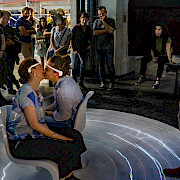
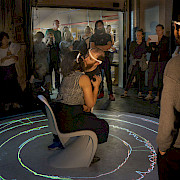
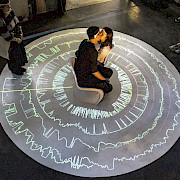
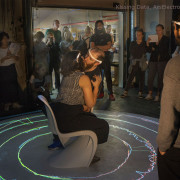
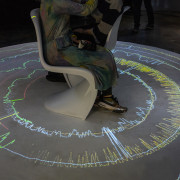
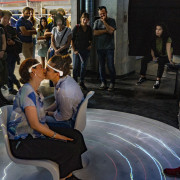
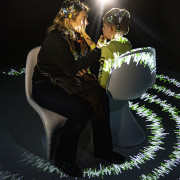
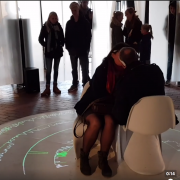
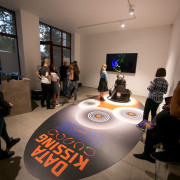
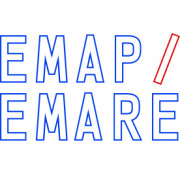


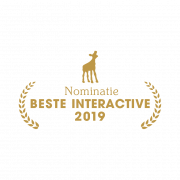
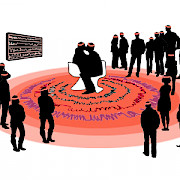
AWARDS
TASIE 2019, Wu Guanzhong Art & Science Innovation Prize, by Tsinghua University Beijing, National Museum of China.
Golden Calf Nomination, Netherlands Film Festival (NFF) Interactive 2019
GAAC Global Art & A.I. Competition 2019 Award China
EMARE /EMAP Award, Europe Media Art Platform - Creative Europe Programme of the European Union
Intimacy Data Symphony
Digital performance art installation, for shared reflection on intimate, empathic interaction, social distancing and proximity.
The artwork explores a Multi-Brain Computer Interface and data as 'co-actors' in a poetic and novel AI & Artificial Emotional approach.
A Communal Kiss Experience
Can a kiss be translated into bio-metric feedback?
How does your kiss feel in E.E.G. data?
Intimacy Data Symphony is a poetic ritual for intimate experience of Kissing and Caressing each other faces, multi-sensory and socially shared in public space of merging realities. In live experiments with Multi-Brain BCI E.E.G. head-sets, visitors are invited as Kissers (or Caressers) and Spectators. Brain activity of people kissing and caressing is measured and visualized in streaming E.E.G. data, real-time circling around them in a floor projection. Simultaneously, the Spectators brain waves are measured, their neurons mirroring activity of intimate kissing and caressing movements, resonating in their imagination. The Spectators brain activity data are interwoven in the data-visualization. Brain activity of all participants, mirroring each others emotional expressions and movements, in interpersonal and aesthetic ways, co-create an immersive visual, Reflexive Datascape. This data-visualization is real-time translated to an algorithm for a soundscape – a ‘Kissing Data Symphony.’
What is a Multi-Brain Computer Interface (Multi-Brain BCI)?
This performance installation premieres a full Multi-Brain BCI. While previous BCI only measure individuals' brain activity, new Multi-Brain BCIs enable measurement of shared corporeal experience, collective experience and emotions in groups, large scale data-collection and algorithms. This research serves AI purposes of predictability, automation, direction and control.
Artists Lancel/Maat critically respond with an Aesthetic Multi-Brain BCI design for public dialogue and imagination, vital to experience of intimacy, empathy and trust.
Multi-Brain BCI for kissing and caressing.
The Multi-Brain Computer Interface Intimacy Data Symphony 'Embraces all participants in a kiss'.
1) All people present - kissing, caressing and spectating - real-time co-create and interpret the emerging Multi-Brain BCI data visualization and –sonification of shared, spontaneous brain activity.
2) The aesthetic principles disrupt relations of control and predictability. Instead, they enable ambiguous perception and shared reflection, through unfamiliar exposure of embodied intimacy and vulnerability; shared responsibility and care; and data unpredictability.
3) A host guides participants and invites them to feel, explore, interpret and make sense in this hybrid intimate social touch process.
Meaning of data patterns in art: Data validation, Data mystification.
‘In science, digital data represents things. In art, digital data points at itself'. (Free to: T. Morton 2018).
This art work is a ‘Reflexive DataScape’, a space for dialogue reclaiming agency for public data-interpretation. Instead of humans being directed by data (that represent and interpret their activities), public participants explore a mode of living with data as 'Co-Actors’. The work aims to provoke shared reflection and authorship on experience of embodiment in merging realities, and new forms of shared storytelling. Participants explore manifold personal interpretations and connections with spontaneous EEG data-traces, fueled with personal memory of intimate experience of kissing and caressing. In the performances, the emerging data traces have shown to evoke tender, strange, unfamiliar (non-)human relations and emphatic processes among participants. Often, they interpret their data traces and patterns as co-created 'intimate portraits'. For experiences, see the Artists Texts.
AI Artificial Intelligent Emphatic Design:
a novel, critical, experimental and sensitive approach.
Lancel/Maat anchor findings of their artistic social syntheses in new performative rituals.
In scientific domains, this experimental approach inspires research into domains of: ordering data patterns; critical shared data appropriation; interaction design in public spaces of merging realities; emotional, artificial intelligence.
The vision of Intimate data Symphony calls for a new aesthetic design approach to intimate, empathic connections in public space - through hosting of exposed vulnerable social touch in shared responsibility and care; co-interpreting realtime emerging datafication; and reflection in dialogue.
EMARE European Media Art Platform Application.
EMARE European Media Art Platform enables Kissing Data to be developed with European partners in different contexts, in relation to emerging (inter)national and (inter)cultural identities and transitions, relating to shared socio-technological developments and media infrastructures. The artists wish to thank EMARE host RIXC, Riga for generous support and inspiration in development and hosting the performance; and EMARE partner Ars Electronica for hosting the performance.